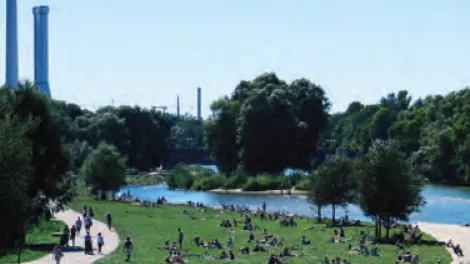The Research Department Life Science Systems (LSS) investigates natural and managed systems from an ecosystem perspective, including social and economic aspects - for example in the forestry and agricultural sectors.
The focus is on understanding the ecological processes underlying the functioning of ecosystems and the development of sustainable ecosystem management strategies. In principle, all compartments (soil to atmosphere) and all groups of organisms in the ecosystem (plants, animals, fungi, microbes, but also humans), their interactions, as well as element and water cycles are included in our research. The department understands ecosystems as part of socio-ecological systems and covers important interfaces between ecosystems and humans to provide science-based support for a good life for people.
Department Head
Prof. Dr. Anja Rammig
Professorship for Land Surface-Atmosphere Interactions
Tel. +49 8161 71 4768
anja.rammig(at)tum.de
Vision
The Department of Life Science Systems conducts transformative research to understand and to govern ecosystems sustainably.
Mission
Research in the Department aims to facilitate a healthy environment and to sustain Nature’s contributions to people. We develop novel land-use systems by enhancing the resilience and adaptive capacity of agricultural, forest, aquatic and urban ecosystems. We improve the understanding of these socio-ecological systems across the boundaries of individual land-use systems and scientific disciplines. Our experts serve society by advising policymaking, engaging in transdisciplinary research and in outreach activities. In its focus on natural and managed ecosystems, the Department contributes to the One Health Strategy of the TUM School of Life Sciences.
Our teaching enables students to think across disciplines in order to investigate, develop and implement environmental governance strategies. We use problem- and solution-orientated learning, and offer a unique range of theoretical, field-based and hands-on courses. In our teaching, we encourage a free exchange of ideas among our international and diverse community of students, and with the faculty and staff.
Contribution to the School's One Health Concept
Within the framework of the One Health concept of the school, the LSS department creates knowledge to promote a healthy environment across ecosystems. Research and teaching contribute to one-system health, and integrate insights from different ecological and socio-economic disciplines to support sustainable land use. While the ecological approach spans from molecules to landscapes, the socio-economic research encompasses individual decisions as well as policy recommendations. The contribution of the department takes into account current and future developments in global change, and associated losses in biodiversity. The department’s interdisciplinary work links ecosystem health to human health and well-being.
Research Focus Areas
Within the European research landscape, the department is unique in that it has a strong focus on land use at the landscape scale, and that it develops strategies that transcend individual ecosystems and disciplines. Research integrates agricultural, forest, freshwater, and urban ecosystems and addresses their links and interactions.
Citizen Science: Tracking Climate Change in your Backyard
How does global warming affect plants, pollen allergies, animals and tree borders in Bavaria? Together with the citizens of Bavaria, Prof. Menzel aims to find a practical means of handling climate change:
BAYSICS-Portal

The interactive citizen science portal BAYSICS provides a forum for this dialog. Explore your environment, enter your observations and join the research.
Read the interview with Prof. Menzel
Early Flowering

Prof. Annette Menzel conducts research on global warming and its impacts on humans and nature in future. Learn how early flowering or phenology can be a bioindicator for climate change.
Read more
Urban Animals

In his citizen science project, Prof. Wolfgang Weisser conducts research on animals in the city in order to change urban planning processes and give greater consideration to the needs of humans and animals.
Learn more
Infrastructure & Equipment of the Department
A strength of the department is the access to state-of-the-art experimental stations and long-term experiments, climate chambers, greenhouses and laboratories. The department manages or has access to a network of experimental and observation sites both nationally and internationally where studies are carried out under field conditions.
In Bavaria, these are three TUM research stations, which are primarily used by the Life Science Systems department: the Environmental Research Station Schneefernerhaus near Garmisch-Partenkirchen, the Friedrich N. Schwarz Station in Berchtesgaden as well as the Limnological Research Station Iffeldorf.

Contact:
Professorship for Land Surface-Atmosphere Interactions (Prof. Rammig / Apl. Prof. Grams)
- KROOF: Kranzberg Forest Roof
- experimental plot with a size of 0.5 ha
- mixed stand comprising large groups of beech surrounded by spruce
- research station with canopy crane, power supply, ecophysiological and meteorological equipment

Contact:
Chair of Soil Science (Prof. Kögel-Knabner)
- NanoSIMS: Nanoscale Secondary Ion Mass Spectrometry
- Cameca NanoSIMS 50L instrument
- Mass spectrometers such as NanoSIMS make the distribution of chemical elements in the soil visible

Contact:
Chair of Renaturation Ecology (Prof. Kollmann / Dr. Teixera)
- research facility TUMmesa: TUM model ecosystem analyser
- eight walk-in climate chambers designed for advanced ecosystem research

Contact:
Associate Professorship of Geomorphology and Soil Science (Prof. Völkel)
- Critical Zone Observatories (CZOs) research field sites
- investigation of terrestrial processes and systems through detailed field observations and in situ measurements
- operates at the watershed scale (carbonatic Ammer Catchment, alpine Ammer Mts. and foreland; crystalline Otter Catchment, mid-mountainous Bavarian Forest)
Contact:
Professorship for "Land Surface-Atmosphere Interactions" (Prof. Rammig)
- Laboratory for stable isotopes
Representation in the School Council
- Prof. Dr. Jürgen Peter Geist
- Prof. Dr. Johannes Kollmann
- Prof. Dr. Sara Diana Leonhardt
- Prof. Dr. Annette Menzel
View the School Council of TUM School of Life Sciences
Finance Committee
- Prof. Dr. Monika Egerer
- Prof. Dr. Axel Göttlein
- Prof. Dr. Johannes Kollmann
- Prof. Dr. Anja Rammig
Appointment strategy (open committee)
- Prof. Dr. Kurt-Jürgen Hülsbergen
- Prof. Dr. Thomas Knoke
- Prof. Dr. Johannes Kollmann
- Prof. Dr. Annette Menzel
- Prof. Dr. Rupert Seidl
- Prof. Dr. Johannes Sauer
IT Officer
- Dr. Martin Döllerer
Website Representative
- Prof. Dr. Johannes Kollmann







